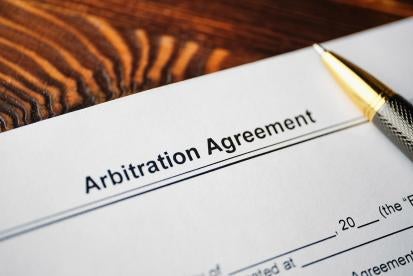On 15 February 2023, the Ninth Circuit Court of Appeals (Ninth Circuit) struck down California Assembly Bill 51 (AB 51), the state’s anti-arbitration legislation, holding that the Federal Arbitration Act (FAA) “preempts AB 51 as a whole to the extent it applies to arbitration agreements.”1 The opinion reverses the Ninth Circuit’s prior position that certain provisions of AB 51 prohibiting employers from requiring applicants and employees to arbitration as a condition of employment (or continued employment) did “not run afoul of the FAA.”2
WHAT IS AB 51?
AB 51 was enacted in 2019 and sought to eliminate forced arbitration in the employment context. “AB 51 effectively bars an employer from requiring an employee or applicant for employment to enter into an agreement to arbitrate certain claims as a condition for being hired or for keeping a job, or from retaliating against an employee or applicant who refuses to do so.”3 It “also bars employers from using an employment contract that requires the employee to take an affirmative step in order to opt out of an arbitration agreement.”
Violations of AB 51 subjected employers to criminal and civil liability.4 “But to avoid preemption by the FAA, the California legislature included a provision ensuring that if the parties did enter into an arbitration agreement, it would be enforceable,” which “resulted in the oddity that an employer subject to criminal prosecution for requiring an employee to enter into an arbitration agreement could nevertheless enforce that agreement once it was executed.”5
THE NINTH CIRCUIT’S PRIOR RULING ON HOLD
In its 2021 ruling in Bonta, the Ninth Circuit held that the FAA does not preempt AB 51 to the extent it regulated an employer’s conduct before an arbitration agreement came into existence.6 It held that the FAA did not preempt AB 51’s punishment of employers who required arbitration agreements as a condition of employment where the employees did not sign the agreement because, in those instances, there was no arbitration agreement at issue. Instead, the Ninth Circuit held that the FAA only preempted AB 51’s punishment of employers where the employee signed the arbitration agreement.
After the Ninth Circuit’s 2021 ruling in Bonta, the U.S. Chamber of Commerce filed a petition for rehearing en banc. The Ninth Circuit deferred ruling on the petition for rehearing until after the U.S. Supreme Court’s ruling in Viking River Cruises, Inc. v. Moriana.7
The U.S. Supreme Court issued its ruling in Viking River on 15 June 2022, holding that the California Supreme Court decision of Iskanian v. CLS Transportation Los Angeles, LLC8 is partly preempted by the FAA, and it concluded that individual Private Attorneys General Act (PAGA) claims can be compelled to arbitration.
On 22 August 2022, the Ninth Circuit issued an order withdrawing its 2021 Bonta opinion and denying the U.S. Chamber of Commerce’s petition for rehearing en banc as moot.
THE NINTH CIRCUIT’S SECOND BONTA RULING
After surveying AB 51’s legislative history and outlining applicable principles of preemption, the Ninth Circuit summarized the “central question” before it as “whether AB 51 stands as an ‘unacceptable obstacle to the accomplishment and execution of the full purposes and objectives of Congress’ in enacting the FAA.”9
The Ninth Circuit answered in the affirmative, explaining that AB 51 “disfavors the formation” of arbitration agreements by preventing the use of mandatory arbitration agreements in the employment context and by imposing civil and criminal penalties on employers who use mandatory arbitration agreements.
The Ninth Circuit reasoned that the foregoing is “antithetical to the FAA’s ‘liberal federal policy favoring arbitration agreements.’” As a result, the Ninth Circuit held that AB 51 is preempted by the FAA.
WHAT SHOULD EMPLOYERS DO NOW?
The Ninth Circuit’s ruling in Bonta clears the path for California employers to issue mandatory arbitration agreements.10 To afford maximum coverage, employers using arbitration agreements should ensure that their agreements include class action waivers and that they require employees to arbitrate their individual PAGA claims in accordance with Viking River.
FOOTNOTES
1 Chamber of Com. of the United States v. Bonta, No. 20-15291, 2023 WL 2013326 at *12 (9th Cir. Feb. 15, 2023) [hereinafter Bonta].
2 Chamber of Com. v. Bonta, 13 F.4th 766, 780 (9th Cir. 2021).
3 Bonta, 2023 WL 2013326 at *4.
4 CAL. LAB. CODE § 433; CAL. GOV’T CODE § 12953.
5 Bonta, 2023 WL 2013326 at *4.
6 Chamber of Com. v. Bonta, 13 F.4th at 780.
7 142 S. Ct. 1906 (2022).
8 59 Cal. 4th 348 (2014).
9 Bonta, 2023 WL 2013326 at *9.
10 Notwithstanding the ruling in Bonta, pre-dispute arbitration agreements remain unenforceable with respect to claims involving sexual assault or sexual harassment. 9 U.S.C. § 402.





 i
i


